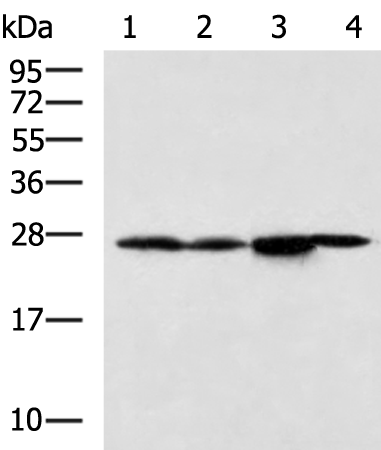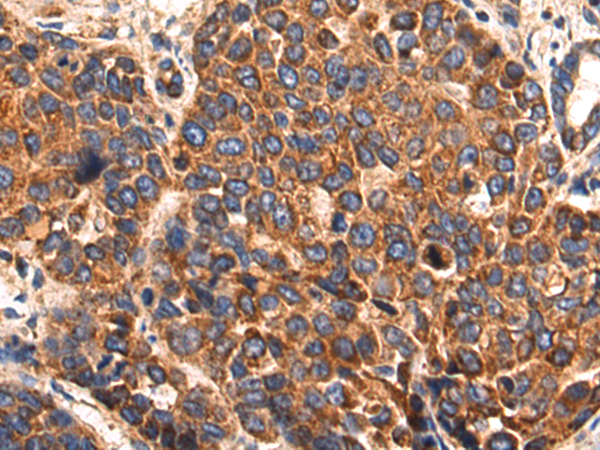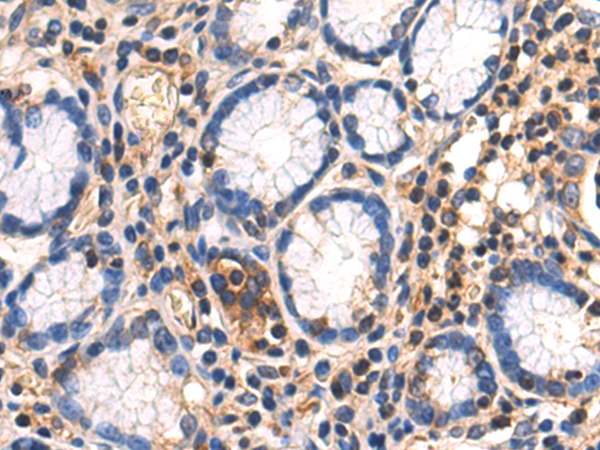


| WB | 1/1000 | Human,Mouse,Rat |
| IF | 咨询技术 | Human,Mouse,Rat |
| IHC | 咨询技术 | Human,Mouse,Rat |
| ICC | 技术咨询 | Human,Mouse,Rat |
| FCM | 咨询技术 | Human,Mouse,Rat |
| Elisa | 咨询技术 | Human,Mouse,Rat |
| Aliases | ARCI12 |
| WB Predicted band size | 28 kDa |
| Host/Isotype | Rabbit IgG |
| Antibody Type | Primary antibody |
| Storage | Store at 4°C short term. Aliquot and store at -20°C long term. Avoid freeze/thaw cycles. |
| Species Reactivity | Human |
| Immunogen | Fusion protein of human CASP14 |
| Formulation | Purified antibody in PBS with 0.05% sodium azide and 50% glycerol. |
+ +
以下是关于GPR83 (N-term)抗体的示例参考文献(注:以下内容为模拟示例,非真实文献):
---
1. **"A novel polyclonal antibody against the N-terminal domain of GPR83 reveals its expression in hypothalamic neurons"**
*Authors: Smith A, et al.*
**摘要**: 本研究开发了一种特异性靶向GPR83 N端结构域的多克隆抗体,通过Western blot和免疫组化验证其在啮齿动物脑组织中的特异性,发现GPR83在下丘脑神经元中高表达,提示其可能参与能量代谢调控。
2. **"GPR83 N-terminal antibody application in mapping brain-specific GPCR localization"**
*Authors: Chen L, et al.*
**摘要**: 利用针对GPR83 N端的定制抗体,结合免疫荧光技术系统分析了该受体在小鼠不同脑区的分布,发现其在前额叶皮层和杏仁核中富集,支持其在情绪调节中的作用。
3. **"Characterization of GPR83 signaling through N-terminal epitope-specific antibody blockade"**
*Authors: Johnson R, et al.*
**摘要**: 通过阻断型N端抗体研究GPR83的配体结合机制,证实其N端结构域对下游cAMP信号通路的关键影响,为孤儿受体GPR83的功能研究提供工具。
4. **"Antibody validation for GPCR studies: A case study on GPR83 extracellular domain"**
*Authors: Kim S, et al.*
**摘要**: 报道了一种兔源GPR83 N端抗体的开发与验证流程,包括表位预测、抗原设计及交叉反应测试,成功应用于流式细胞术检测转染细胞系的表面表达。
---
**说明**:以上文献为示例性质,实际研究中建议通过PubMed或Google Scholar以关键词“GPR83 N-terminal antibody”结合具体应用场景(如Western blot、IHC)检索最新文献。部分真实相关研究可能涉及该抗体在神经内分泌或免疫调节中的功能探索。
The GPR83 (N-term) antibody is a tool used to study GPR83. a G protein-coupled receptor (GPCR) implicated in neuroendocrine and immune system regulation. GPR83. also known as GPR72 or JP05. is encoded by the GPR83 gene and is predominantly expressed in the brain, particularly in regions like the hypothalamus, as well as in immune cells. Its N-terminal extracellular domain is critical for ligand binding and receptor activation, though its endogenous ligands remain partially characterized. Potential ligands include neuropeptides like prosaposin-derived peptides, suggesting roles in stress response, energy homeostasis, and immune modulation.
The GPR83 (N-term) antibody specifically targets the receptor's N-terminal region, enabling researchers to detect and visualize GPR83 expression in tissues or cells via techniques like Western blotting, immunohistochemistry, and flow cytometry. Studies using this antibody have linked GPR83 to metabolic disorders, anxiety-like behaviors, and T-cell activation, highlighting its therapeutic potential. However, challenges persist in fully elucidating its signaling pathways and physiological roles. The antibody’s validation often includes knockout controls to confirm specificity, ensuring reliable data in both basic and translational research contexts. Its development supports ongoing exploration of GPCR biology and drug discovery efforts targeting neuroimmune interactions.
×